- Home
- J. D. Robb
[In Death 17] - Imitation in Death Page 8
[In Death 17] - Imitation in Death Read online
Page 8
“Yes, I heard of the killing.” He leaned back, but his eyebrows lowered. “A licensed companion, in the Chinatown district.”
“Yes, sir. In the course of my investigation, I’ve had reason to research and trace a certain brand of stationery. You purchased this brand of writing paper six weeks ago in London.”
“I was in London this summer for a few days, and did, indeed, buy stationery. Several different types, as I recall. Some for personal use, some for gifts. Am I to understand that this purchase makes me a suspect in this woman’s death?”
He was cool, she thought. More intrigued than worried or annoyed. And, if she wasn’t mistaking that faint curve of mouth, he was a little amused. “In order to expedite my investigation, I need to check all the names of purchasers, and verify their whereabouts on the night in question.”
“I see. Lieutenant, can I assume this line of investigation is secure and discreet? Having my name linked, however loosely, with a licensed companion and a murder would generate considerable unwanted media attention on myself, on Delegate Evans.”
“The name won’t be made public.”
“All right. Night before last?”
“Between midnight and three.”
He didn’t reach for his book, but instead steepled his fingers, watched Eve over the tips. “My wife and I attended the theater. A production of Six Weeks by William Gantry, a British playwright. At Lincoln Center. We were in the company of two other couples, left the theater at about eleven, then had a post-theater drink at Renoir’s. I believe we left there, my wife and I, around midnight. We’d have been home by twelve-thirty. My wife went to bed, and I worked in my home office for perhaps an hour. It might’ve been a little longer. Following habit, I would have watched about thirty minutes of news, then retired for the night.”
“Did you see or speak with anyone after your wife went to bed?”
“I’m afraid I didn’t. I can only tell you that I was home, tending to my work when this murder took place. I’m confused how buying this paper connects me to this woman, or her death.”
“Her killer wrote a note on that stationery.”
“A note.” Now Renquist’s eyebrows lifted. “Well. That was rather arrogant of him, wasn’t it?”
“He’s not really covered for the time of the murder either,” Peabody pointed out as they walked back to the car.
“That’s the problem when somebody buys it at two in the morning. Most of the suspects are going to claim they were home, innocently tucked into their own beds. They got their own security, or a way around hotel or apartment security, it’s tough to call them a stinking liar.”
“Do you think he is a stinking liar?”
“It’s early yet.”
She tracked Elliot Hawthorne down on the eleventh hole of a private club on Long Island. He was a sturdy, tough man, with a shock of white hair fluttering around under a tan cap, matched by the luxurious white mustache that set off his tanned face. There were lines scored around his mouth, fanned out from his eyes, but the eyes themselves were sharp and clear as he drove the ball off the tee.
He passed the driver back to his caddy, hopped in a small white cart, then signaled for Eve to join him. “Talk fast” was all he said as he sent the cart zipping forward.
She did, giving him the details as Peabody and the caddy followed on foot.
“Dead whore, fancy writing paper.” He gave a little grunt as he stopped the cart. “Used whores from time to time, never kept track of their names.” He jumped out, circled his ball, studied the lay. “Got a young wife, don’t need whores now. Don’t remember the paper. You got a young wife, you buy all sorts of useless shit. London?”
“Yes.”
“August. London, Paris, Milan. I still got my fingers in some business, and she likes to shop. If you say I bought the paper, I bought the paper. So what?”
“It’s tied to the murder. If you could tell me where you were between midnight and three, night before last—”
He let out a bark of laughter, stood from where he’d crouched by the ball and gave her his full attention. “Young lady, I’m more than seventy. I’m fit, but I need my sleep. I play eighteen holes every morning, and before I do, I have a good breakfast, read the paper, and check the stock reports. I’m up every morning at seven. I’m in bed every night by eleven unless my wife drags me out to some shindig. Night before last I was in bed by eleven, and after making love to my wife—a process that doesn’t take as long as it once did—I was asleep. Can’t prove it, of course.”
He brushed her back, turned to the caddy. “Gimme the seven iron, Tony.”
She watched him set, sight, then smack the ball into a pretty arch. It bounced on the green and rolled to within about five feet of the cup.
From Hawthorne’s wide grin, she assumed it was a good shot.
“I’d like to speak with your wife.”
He shrugged, handed the club back to the caddy. “Go ahead. She’s over at the courts. Got a tennis lesson today.”
Darla Hawthorne was dancing around on a shaded court in a candy pink romper with a flippy skirt. She was doing more dancing than actual connecting with the ball, but she looked damn good doing so. She was built like a teenager’s wet dream, lots of soft, jiggling breast barely contained, and long, long legs shown off by the little skirt and matching pink shoes.
She was so evenly tanned, she might have been painted.
Her hair, which must have hit her waist when unrestrained, was tied back in a ribbon—pink, natch—and scooped through the hole in her little pink visor. It swung happily back and forth as she pranced over the court and missed the bright yellow ball.
When she bent over to retrieve it, Eve was treated to the sight of her heart-shaped butt in tight, high-cut panties under the skirt.
Her instructor, a hunky guy with lots of streaky hair and white teeth, called out direction and encouragement.
At one point, he came over to stand behind her, nuzzling her back against him as he adjusted her swing. She sent him a big, lash-fluttering smile over her shoulder.
“Mrs. Hawthorne?” Before the balls could start flying again, Eve stepped onto the court.
Tennis guy immediately rushed forward. “Boots! You can’t walk on this surface without the proper foot attire.”
“I’m not here to whack balls.” She held up her badge. “I need a moment with Mrs. Hawthorne.”
“Well, you have to take those off, or stand on the sidelines. We have rules.”
“What’s the problem, Hank?”
“There’s a policewoman here, Mrs. H.”
“Oh.” Darla bit her lip, and patting her heart walked over to the end of the net. “If this is about that speeding ticket, I’m going to pay it. I just—”
“I’m not Traffic. Can I have a minute?”
“Oh, sure. Hank, I could use a break anyway. Getting all sweaty.” She walked, with a lot of swinging hip, to a bench, opened a pink bag and took out a bottle of designer water.
“Could you tell me where you were night before last? Between midnight and three.”
“What?” Beneath the glow on her perfect oval face, Darla paled. “Why?”
“It’s just a routine stop in a matter I’m investigating.”
“Sweetie knows I was home.” Her eyes, mermaid green, began to swim. “I don’t know why he’d have you investigating me.”
“I’m not investigating you, Mrs. Hawthorne.”
Hank walked over, handed her a small towel. “Any problem, Mrs. H?”
“No problem here, go flex your muscles someplace else.” Dismissing him, Eve sat beside Darla. “Midnight and three, night before last.”
“I was home in bed.” She shot Eve a defiant look now. “With Sweetie. Where else would I be?”
Good question, Eve thought.
She asked about the writing paper, but Darla shrugged it off. Yes, they’d been in Europe in August, and she bought a lot of things. Why shouldn’t she? How was she supposed to remember everything she�
�d bought or that Sweetie bought for her?
Dallas circled around for another few minutes, then stood so Darla could walk back, and be comforted by Hank. He shot Eve a nasty look before leading his student toward what Eve assumed was the clubhouse.
“Interesting,” Eve stated aloud. “Looks like our Darla was out, practicing on Hank’s balls during at least part of the time in question.”
“Definitely getting more than instruction on her backswing,” Peabody agreed. “Poor Sweetie.”
“If Sweetie knows his wife’s playing singles with her tennis pro, he could’ve used the time she was out pulling his racket to get downtown, do Wooton. You got a wife’s running cross-court on you, it pisses you off. So you not only kill a whore—and what’s your young, unfaithful wife but a whore—but you use the cheating bitch as your alibi. Game, set, match. Very neat.”
“Yeah, and I liked your tennis metaphors, too.”
“We do what we can. Anyway, it’s a theory. Let’s go see what else we can dig up on Hawthorne.”
He’d been married three times, as Roarke had stated, with each successive spouse younger than the preceding one. He’d divorced both former Mrs. Hawthornes, and had nipped them off with the lowest possible financial package, as arranged through a premarital agreement. An iron-clad one from the results, Eve mused.
The man was no fool.
Would such a careful and canny man be oblivious to his current wife’s activities?
He had no criminal record, though he’d been sued a number of times in civil court for various financial deals. A quick scan told her most of them were nuisance suits, brought by unhappy and unlucky investors.
He owned four homes, and six vehicles, including a yacht, and was associated with numerous charities. His reported worth was just under a billion.
Golf, according to the various media articles and features she scanned through, appeared to be his god.
Every name on her list had an alibi corroborated by a spouse or partner or employee. Which meant none of them held much weight.
Sitting back, Eve propped her feet on her desk, closed her eyes, and took herself back into the Chinatown alley.
She walks in ahead of him. She leads the john. Her feet hurt. She’s got a bunion. Shoes are killing her. Two in the morning. Hot, airless. Not much business tonight. Only two hundred in her cash bag.
Gives her four, maybe five johns on this circuit, depending what they wanted.
Been in the game a long time, knows to get payment up-front. Did he take it back, or didn’t he give her a chance to take it? No chance, she decided. He’d want to move fast. Spins her around. Wants her facing the wall.
Does he touch her? Run his hand over her breast, her ass, slide it over her crotch?
No, no time for that. Not interested in that. Especially after the blood gushes out on his hands.
Warm blood. That’s what got him off.
Against the wall. Tug her head back by the hair. Left hand. Slice the scalpel over her throat with the right. Left to right, slight downward path.
Blood gushes, splashes on the wall, splashes back at her face, her body, his hands.
She’s alive for a few seconds, just a few, shocked seconds when she can’t scream, and her body jerks a little as it dies.
Lay her down, head toward the opposite wall. Get out your tools.
A light, some sort of light. Can’t do that sort of precision work in the dark. Laser scalpel, use the light from the laser scalpel to guide the way.
Put what you came for in a leakproof bag, clean off your hands. Change your shirt or take off what you were wearing over it. Everything in a bag or case now. Check yourself, make sure you’ll pass on the street.
Take out the note. Smile at it, amuse yourself. Place it carefully on the body.
Walk out of the alley. Fifteen minutes, maybe. No more than fifteen, and you’re walking away. Carrying your prize back to your car. Excited, but controlled. Need to drive carefully. Can’t risk a routine stop when you smell of death and have that part of her with you.
Back home. Reset security. Shower. Dispose of your clothes.
You did it. You’ve imitated one of the great killers of the modern age, and no one’s the wiser.
She opened her eyes, stared up at the ceiling. If it was one of her five current candidates, he’d have to dispose of the body part as well, or have a very secure place to keep it as a souvenir.
Would a regular household recycler handle that sort of thing, or would you need something that handled medical waste? She’d need to check on that.
Bringing up a map on-screen, she calculated time and distance from the murder site to each of the suspect’s residences. Giving fifteen minutes in the alley, the time to hunt the victim—likely scoped out at some point earlier—clean up, drive home. Any of them could have done the job in under two hours.
Straightening up, she began to type up a report, hoping inspiration would strike. When it didn’t, she read over the facts, finished it off, and filed it.
She spent another hour learning about recyclers and the availability of laser scalpels. And decided to go back to the scene.
The street did a decent business during the day. A couple of bars, a storefront eatery, a market, and a money exchange were the closest businesses to the alley.
Only the bars had been open after midnight, and both of them were at the far ends of the block. Though the neighborhood had already been canvassed, she swung through each place again, running the routine, asking the questions, coming away empty.
She ended up standing at the mouth of the alley again with the beat cop, the neighborhood security droid, and Peabody.
“Like I said,” the cop named Henley told her, “I knew her, the way you know the locals LCs. She never caused any trouble. Technically, they’re not supposed to use the alley or any public access for work, but most of them do. We roust them now and again for it.”
“She ever complain about any john getting rough or hassling her?”
“Wouldn’t have.” Henley shook his head. “She steered clear of me, and the droid. Give me a little nod if we passed each other on patrol, but she wasn’t the friendly sort. We get some rough stuff in this sector—johns and janes slapping an LC around. You got some mopes coming through mugging them, and sometimes they wave a sticker around. Had some use ’em, but not like this. Never had anything like this.”
“I want a copy of any reports where they used a sticker, any kind of blade.”
“I can get that for you, Lieutenant,” the droid told her. “How far back do you want to go?”
“Give me a full year. Keep it to attacks on women, with LCs the priority. Maybe he practiced first.”
“Yes, sir. Where should I transmit?”
“Send it to me at Central. Henley, where’s the safest place to park in this area? Street or underground, not a surface lot or port.”
“Well, you want quiet, lower crime, probably you’d go west, maybe Lafayette. You want busy, so there’s too much going on for anybody to mess with your ride, you could hike it up the other side of Canal, into Little Italy. Restaurants stay open late.”
“Okay, we’re going to try this. One of you take from here to Lafayette, the other head north. Ask residents, merchants who might have been around at that time of night, if they noticed a guy alone carrying a bag. Some kind of bag, good-sized one. He’d’ve been moving along pretty quick, no meandering, and going for a car. Talk to the LCs,” she added. “One of them may have tried to hustle him and got brushed off.”
“Long shot, sir,” Peabody said when they’d split off again.
“Somebody saw him. They don’t know it, but they saw him. We get lucky, jog a few memories.” She stood on the sidewalk, baking in the heat as she scanned the street.
“We’re going to have to see how much we can stretch the budget for added security and surveillance for a square mile around this scene. He’ll stick to the mile, stick to the script. And it played too well for him the first
time—he’s not going to want to wait too long before act two.”
Chapter 6
It was a difficult meeting for him to take. It had to be done, and Roarke could only hope that some of the weight he was carrying at the base of his skull would lift once it was over.
He’d put it off too long already, and that wasn’t like him. Then again, he hadn’t felt completely like himself since he’d met Moira O’Bannion, and she’d told him her tale.
His mother’s story.
Life, he thought, as he stared out the wide window wall of his midtown office, could take a big chunk out of your ass when you were least prepared for it.
It was after five already, and his timing had been deliberate. He’d wanted to meet with Moira at the end of the day, so that there was no business to be done afterward. So that he could go home and try to shift it all aside with an evening out with his wife.
His interoffice ’link beeped, and damn him, he nearly jolted.
“Yes, Caro.”
“Ms. O’Bannion’s here.”
“Thanks. Bring her back.”
He watched the traffic, air and sky, and thought idly that the trip home would be a bit of a bitch just now. The commuter trams were already loaded, and from his lofty perch he could see dozens of tired, irritable faces packed together like rowers on a slave ship for the hot journey home.
On the street below, buses were chugging, cabs standing like a clogged river, and the walks and people glides were mobbed.
Eve was down there somewhere, he expected. No doubt having an annoyed thought at the prospect of having to dress up and socialize after a day of chasing a killer.
More than likely, she’d rush in, flustered, with minutes to spare and struggling to make that odd transition from cop to wife. He doubted she had any idea how it thrilled and delighted him to see her make that slippery change.
At the knock on his door, he turned. “Yes.”
His admin brought her in, so that he found himself amused, for a moment, at the sight of two neat, trim, well-dressed women of a certain age stepping into his office.
“Thank you, Caro. Ms. O’Bannion, thank you for coming. Won’t you have a seat? Would you like anything? Coffee? Tea?”

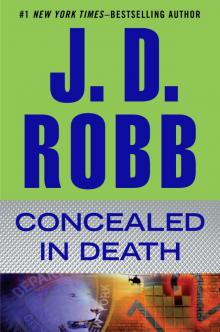 Concealed in Death
Concealed in Death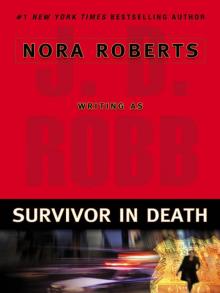 Survivor in Death
Survivor in Death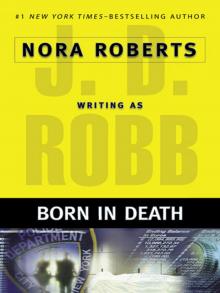 Born in Death
Born in Death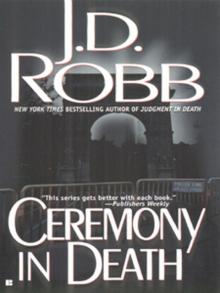 Ceremony in Death
Ceremony in Death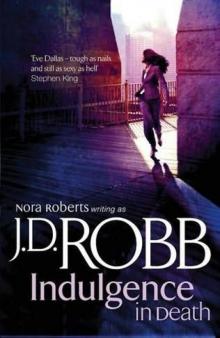 Indulgence in Death
Indulgence in Death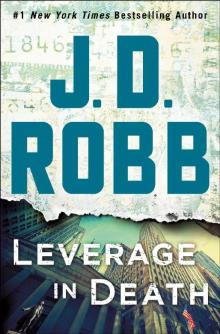 Leverage in Death
Leverage in Death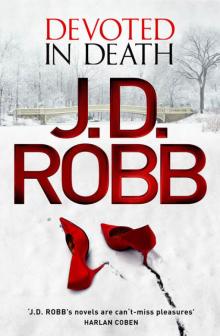 Devoted in Death
Devoted in Death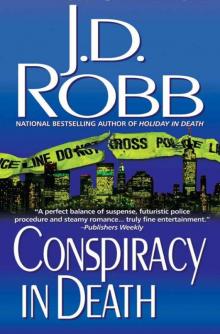 Conspiracy in Death
Conspiracy in Death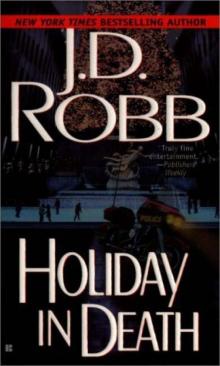 Holiday in Death
Holiday in Death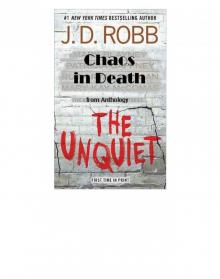 The Unquiet
The Unquiet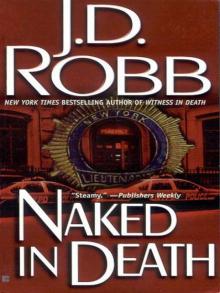 Naked in Death
Naked in Death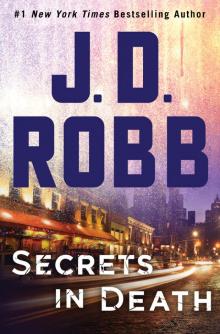 Secrets in Death
Secrets in Death Seduction in Death
Seduction in Death Strangers in Death
Strangers in Death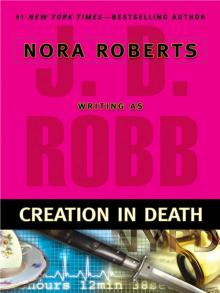 Creation in Death
Creation in Death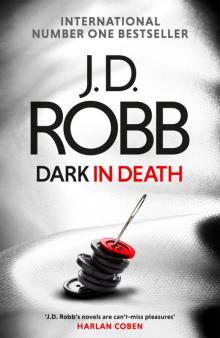 Dark in Death
Dark in Death Possession in Death
Possession in Death Visions in Death
Visions in Death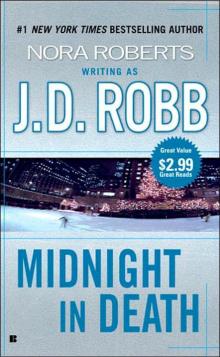 Midnight in Death
Midnight in Death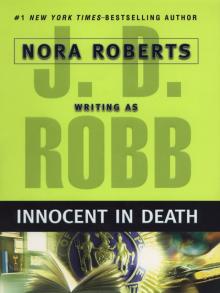 Innocent in Death
Innocent in Death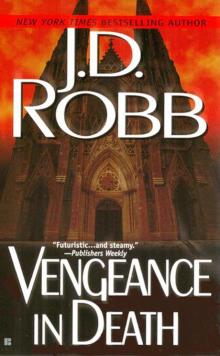 Vengeance in Death
Vengeance in Death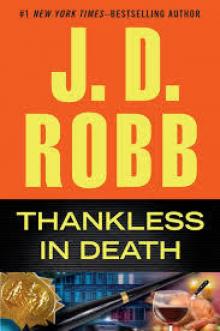 Thankless in Death
Thankless in Death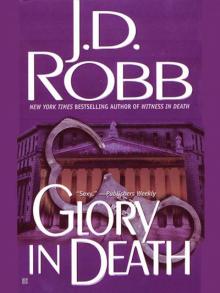 Glory in Death
Glory in Death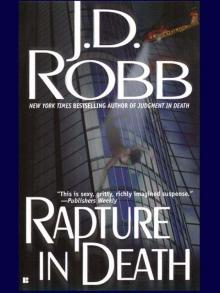 Rapture in Death
Rapture in Death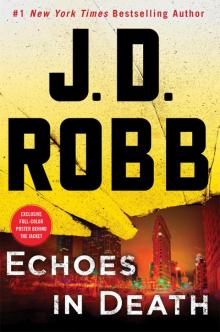 Echoes in Death
Echoes in Death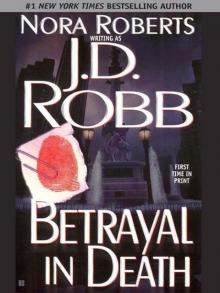 Betrayal in Death
Betrayal in Death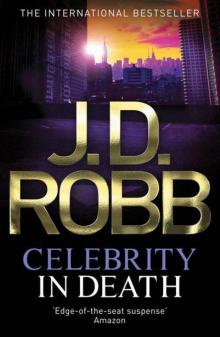 Celebrity in Death
Celebrity in Death Immortal in Death
Immortal in Death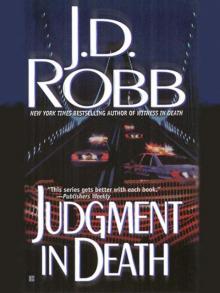 Judgment in Death
Judgment in Death Ritual in Death
Ritual in Death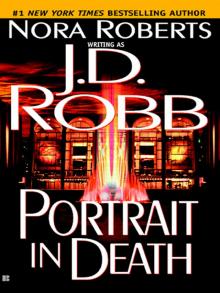 Portrait in Death
Portrait in Death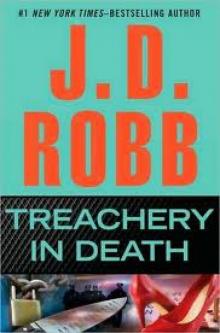 Treachery in Death
Treachery in Death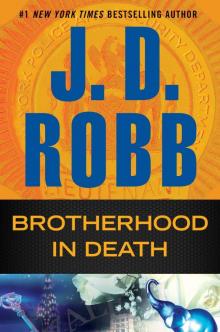 Brotherhood in Death
Brotherhood in Death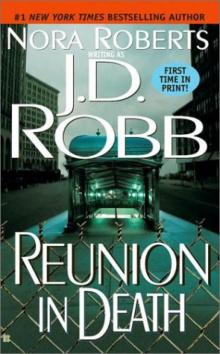 Reunion in Death
Reunion in Death Connections in Death: An Eve Dallas Novel
Connections in Death: An Eve Dallas Novel Imitation in Death
Imitation in Death New York to Dallas
New York to Dallas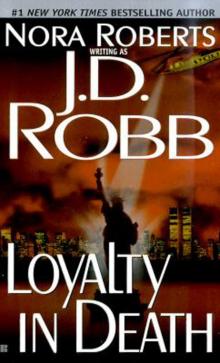 Loyalty in Death
Loyalty in Death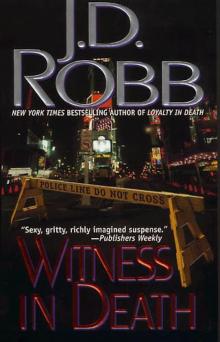 Witness in Death
Witness in Death Connections in Death
Connections in Death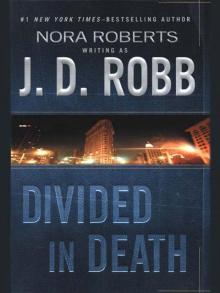 Divided in Death
Divided in Death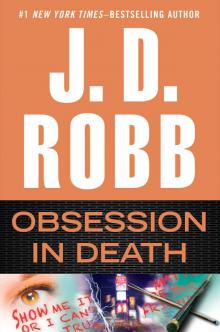 Obsession in Death
Obsession in Death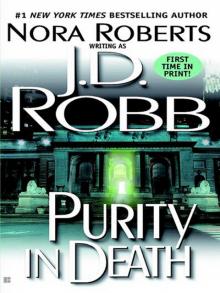 Purity in Death
Purity in Death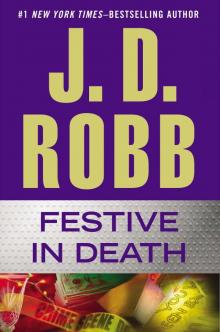 Festive in Death
Festive in Death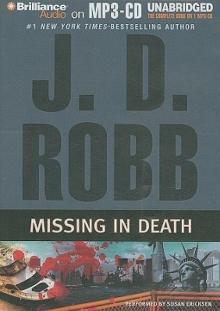 Missing in Death
Missing in Death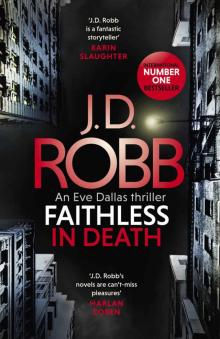 Faithless in Death: An Eve Dallas Thriller (Book 52)
Faithless in Death: An Eve Dallas Thriller (Book 52)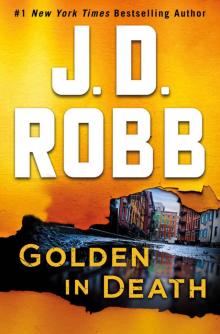 Golden in Death
Golden in Death The In Death Christmas Collection
The In Death Christmas Collection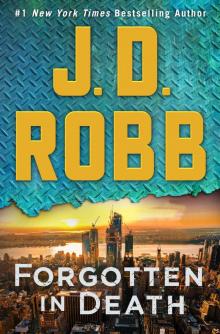 Forgotten in Death
Forgotten in Death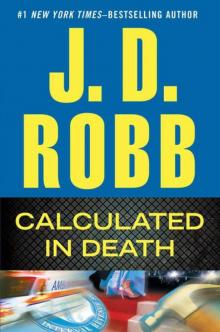 Calculated in Death
Calculated in Death Salvation in Death
Salvation in Death Interlude in Death
Interlude in Death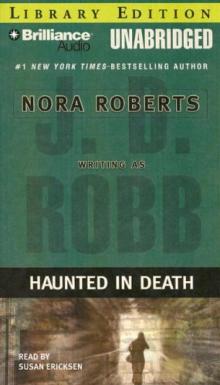 Haunted in Death
Haunted in Death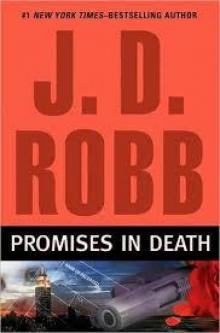 Promises in Death
Promises in Death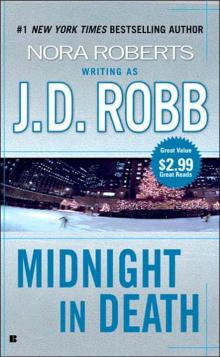 In Death 07.5 - Midnight in Death
In Death 07.5 - Midnight in Death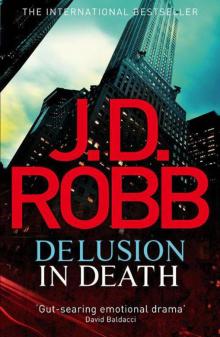 44 Delusion in Death
44 Delusion in Death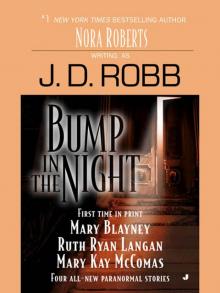 Bump in the Night
Bump in the Night The In Death Collection, Books 16-20
The In Death Collection, Books 16-20![[In Death 17] - Imitation in Death Read online](http://i1.bookreadfree.com/i/03/20/in_death_17_-_imitation_in_death_preview.jpg) [In Death 17] - Imitation in Death
[In Death 17] - Imitation in Death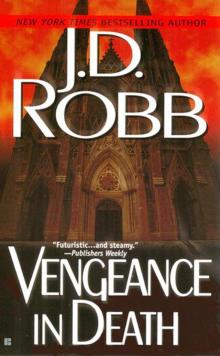 In Death 06 - Vengeance in Death
In Death 06 - Vengeance in Death Dead Of Night
Dead Of Night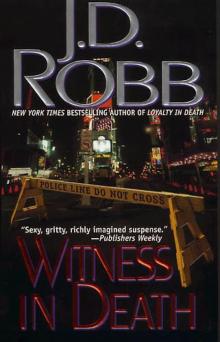 In Death 10 - Witness in Death
In Death 10 - Witness in Death![[In Death 16] - Portrait in Death Read online](http://i1.bookreadfree.com/i1/03/27/in_death_16_-_portrait_in_death_preview.jpg) [In Death 16] - Portrait in Death
[In Death 16] - Portrait in Death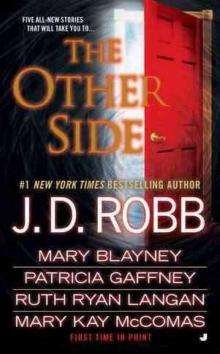 Possession in Death edahr-39
Possession in Death edahr-39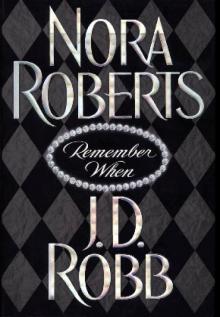 Remember When edahr-20
Remember When edahr-20 Big Jack
Big Jack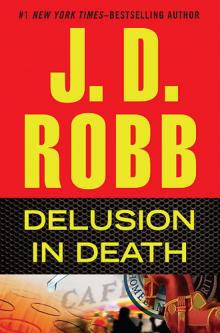 Delusion in Death edahr-44
Delusion in Death edahr-44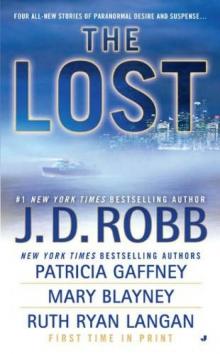 Missing in Death edahr-36
Missing in Death edahr-36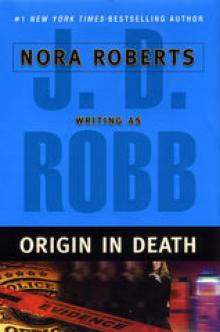 Origin in Death edahr-24
Origin in Death edahr-24![[In Death 18] - Divided in Death Read online](http://i1.bookreadfree.com/i1/04/03/in_death_18_-_divided_in_death_preview.jpg) [In Death 18] - Divided in Death
[In Death 18] - Divided in Death The Lost
The Lost![[In Death 05] - Ceremony in Death Read online](http://i1.bookreadfree.com/i1/04/01/in_death_05_-_ceremony_in_death_preview.jpg) [In Death 05] - Ceremony in Death
[In Death 05] - Ceremony in Death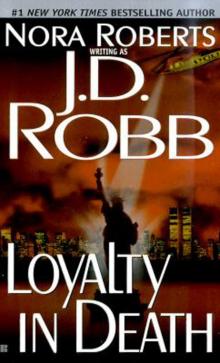 In Death 09 - Loyalty in Death
In Death 09 - Loyalty in Death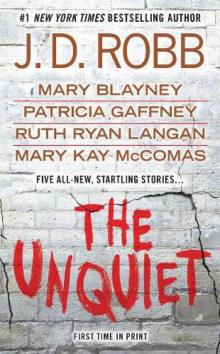 Chaos in Death edahr-42
Chaos in Death edahr-42 In Death 12.5 - Interlude in Death
In Death 12.5 - Interlude in Death![In Death [47] Leverage in Death Read online](http://i1.bookreadfree.com/i1/04/01/in_death_47_leverage_in_death_preview.jpg) In Death [47] Leverage in Death
In Death [47] Leverage in Death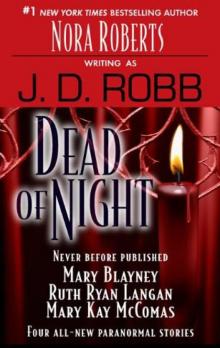 In Death - 24.50 - Dead of Night
In Death - 24.50 - Dead of Night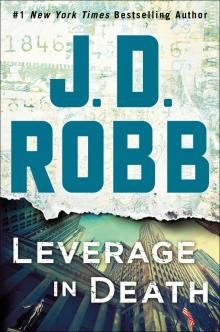 Leverage in Death--An Eve Dallas Novel
Leverage in Death--An Eve Dallas Novel![[In Death 24] - Innocent in Death Read online](http://i1.bookreadfree.com/i1/04/05/in_death_24_-_innocent_in_death_preview.jpg) [In Death 24] - Innocent in Death
[In Death 24] - Innocent in Death![[In Death 15] - Purity in Death Read online](http://i1.bookreadfree.com/i1/04/05/in_death_15_-_purity_in_death_preview.jpg) [In Death 15] - Purity in Death
[In Death 15] - Purity in Death The In Death Collection, Books 26-29
The In Death Collection, Books 26-29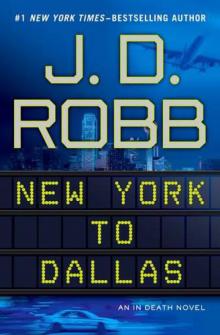 New York to Dallas edahr-41
New York to Dallas edahr-41 The Other Side
The Other Side The In Death Collection 06-10
The In Death Collection 06-10![[In Death 08] - Conspiracy in Death Read online](http://i1.bookreadfree.com/i2/04/05/in_death_08_-_conspiracy_in_death_preview.jpg) [In Death 08] - Conspiracy in Death
[In Death 08] - Conspiracy in Death The In Death Collection, Books 21-25
The In Death Collection, Books 21-25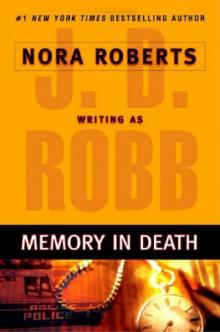 Memory in Death edahr-25
Memory in Death edahr-25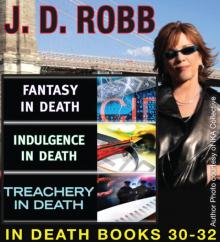 The In Death Collection, Books 30-32
The In Death Collection, Books 30-32 Down the Rabbit Hole
Down the Rabbit Hole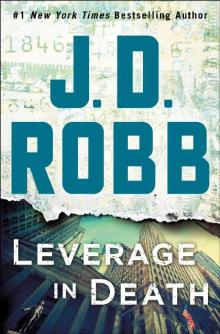 Leverage in Death: An Eve Dallas Novel (In Death, Book 47)
Leverage in Death: An Eve Dallas Novel (In Death, Book 47) The In Death Collection, Books 6-10
The In Death Collection, Books 6-10 The In Death Collection, Books 11-15
The In Death Collection, Books 11-15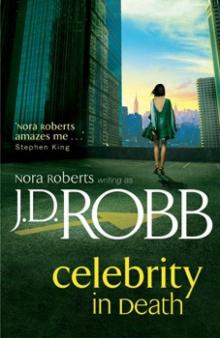 Celebrity in Death edahr-43
Celebrity in Death edahr-43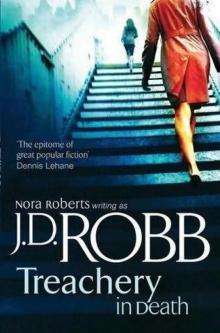 Treachery in Death edahr-40
Treachery in Death edahr-40![[In Death 12] - Betrayal in Death Read online](http://i1.bookreadfree.com/i2/04/13/in_death_12_-_betrayal_in_death_preview.jpg) [In Death 12] - Betrayal in Death
[In Death 12] - Betrayal in Death The In Death Collection, Books 1-5
The In Death Collection, Books 1-5